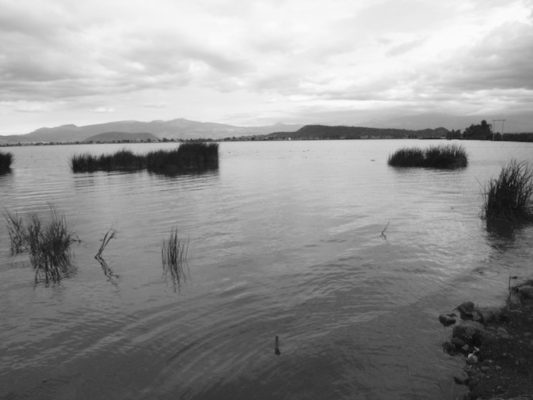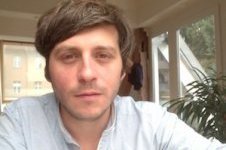Search
To search for an exact match, type the word or phrase you want in quotation marks.
A*DESK has been offering since 2002 contents about criticism and contemporary art. A*DESK has become consolidated thanks to all those who have believed in the project, all those who have followed us, debating, participating and collaborating. Many people have collaborated with A*DESK, and continue to do so. Their efforts, knowledge and belief in the project are what make it grow internationally. At A*DESK we have also generated work for over one hundred professionals in culture, from small collaborations with reviews and classes, to more prolonged and intense collaborations.
At A*DESK we believe in the need for free and universal access to culture and knowledge. We want to carry on being independent, remaining open to more ideas and opinions. If you believe in A*DESK, we need your backing to be able to continue. You can now participate in the project by supporting it. You can choose how much you want to contribute to the project.
You can decide how much you want to bring to the project.

To construct knowledge is an act of recollection and opposition. Chalco a suburb in the city of Mexico with a history that dates back to the arrival of Hernán Cortés in Mexico, Tenochtitlan, is a map that unfurls in the work “The Return of a Lake”, by Maria Thereza Alves. It is narrative that is quite other than that of progress and the cult of wealth, the history of sublime greed, of a lake that dries up and re-emerges. Maria Thereza Alves (San Paulo, 1961) grew up in New York and has lived since the nineties in Berlin. A constant in her work has been Artistic Research, a strategy that makes a dialogue out of aesthetics and knowledge.
Published at the end of August by the German publishers Walther König, “The return of a lake” is the result of a decision: to travel to the locality of Chalco in 2009 to investigate the origins of the fortune of Íñigo Noriega Laso, an Asturian close to the dictator Porfirio Díaz who emigrated to Mexico in 1867 and returned as the second richest man in the country. Noriega is offered a tempting deal: to dry the lake of Chalco, on the outskirts of Mexico City and turn it into cultivable land. With the first harvest Noriega had earned a million pesos. The inhabitants of the town of Xico, on the shores of the lake, migrate to a new locality that is today called Xico Nuevo. Already in 1908 the lake no longer existed. Mexico City is today one of the driest in the world.
Alves places different conflicts in contact with each other, amongst them: the lake that disappeared in 1908 and the one that re-emerges at the beginning of the 21st century, changing the landscape and placing at risk the new ecosystem; a museum in Asturias that pays homage to the gold digger Noriega Laso and a community museum in Chalco that endeavours to recompile fragments and tell the story of the origins and the displacement. Through interviews with townsfolk like the ‘Chalca’ Raymundo Martínez, the director of the museum of Xico itself, Genaro Amaro Altamirano – a researcher of Nahua origin – and the old lady, Macaria Martínez, ex-owner of one of the terrains ceded to Noriega Laso, Alves re-contextualizes pieces of knowledge that are revealed with the help of ethnographical methods. In this way she unleashes a map of the history and the present day, of where the water seeps through the cracks of the precarious, self-constructed homes and the volume of rainwater and sewage that inundate the narrow and empty streets of a new nature.
The project was presented in Documenta 13 in Kassel, while an action established a dialogue between protocol, condemnation and art action. In October 2012 Genaro Amaro Altamirano travelled to Colombres, Asturias, to deliver officially the report on the destruction of the lake and the leading role of Noriega Laso in the process, while also handing the book itself to the director of the Archivo de Indianos and Museo de la Emigración – that is found in the native city of the exploiter, housed in the house where he was born. The gesture is a ritual. Not of pacification, so much as of re-emergence. Alves declared: “This is an excellent moment for Europe to face its colonial history”.
“The Return of a Lake” is the custodian of a multiple process: intervening in the local dynamics of the community, giving it a voice in the space of the book. Rescuing the rhetoric of the documentary letters of the 16th century, the headings in the book exposing the abuse. Here are just a few; “Íñigo Noriega was not a good man and was harsh on his workers”, “Some of the evil things that are being done at the lake today”.
The work is not just a record and reorganisation of a report about the present (exhausted, the growing sublimation of scarcity). Alves highlights the fault and demands reparations. Re-writing histories: the lake that disappears and returns, the museum that denounces and the one that honours; the successful Indiano and the one who remains silent. They are all united and separated by a desert: the Atlantic and silence.

Teobaldo Lagos Preller (Puerto Montt, 1978) is a curator, author and researcher. He holds a PhD in history and theory of contemporary art from the UB, a Master of Arts in Interdisciplinary Latin American Studies from the Freie Universität Berlin and a degree in social communication (Intertextual Semiotics) from the UAM-X in Mexico City. As a curator, during 2022-23 he collaborates with the artist Stine Marie Jacobsen in the implementation of Law Shifters, a conceptual work and collective creation of draft laws with the female and LGBTQIA+ community at the Museo de la Memoria y los Derechos Humanos in Santiago de Xile. During 2021 she co-curated “Museum of Democracy” at nGbK Berlin. His area of research is art and the public sphere, with a focus on immaterial transformation processes, things and public space. She has published in several magazines in the Americas and Europe. He is based in Berlin since 2008.
"A desk is a dangerous place from which to watch the world" (John Le Carré)